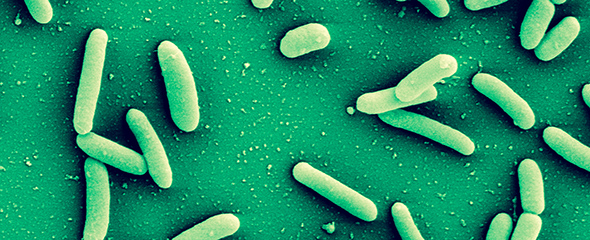The Pseudomonas aeruginosa pathogen is a serious hazard, especially for hospital patients with a compromised immune system. Bacteria of this species can infect all organs of the body and thereby cause recurrent pneumonia, sepsis and chronic wound infections. Due to their widespread resistance to antibiotics, the bacteria are often difficult to subject to treatment. Moreover, Pseudomonas bacteria are capable of producing their own protective habitat: They agglomerate into dense colonies – so-called biofilms – that shield them from defence reactions of the immune system and the effect of antibiotics. Accordingly, scientists are looking for possible targets in the processes of biofilm production in order to control Pseudomonas bacteria.
If we manage to block the sugar binding site of these lectins, Pseudomonas can no longer produce a biofilm and becomes susceptible to medications.
Lectins play a key role in the production of biofilms. These proteins are released by the bacteria and bind to sugar molecules outside the bacterial cells. They cross-link the sugar molecules into a matrix and help the Pseudomonas bacteria adhere to the tissue of the infected host, where they produce a dense colony. "If we manage to block the sugar binding site of these lectins, Pseudomonas can no longer produce a biofilm and becomes susceptible to medications," says Dr Alexander Titz, who is the head of the "Medical Chemistry of Natural Products" junior research group, located in Saarbrücken, of the German Center for Infection Research. Starting with mannose, a sugar molecule that is one of the natural binding partners of the LecB lectin, the scientists working with Titz developed an artificial molecule over the past five years that binds highly specifically to LecB and, by doing so, blocks the protein.
"We looked at the three-dimensional molecular structure of the complex of LecB and mannose to develop a small molecule that should have similar binding properties," Titz says. "We then optimised the structure of this molecule step-by-step based on our laboratory results such that it can now bind sufficiently long to LecB and also is stable to the effect of degrading enzymes of the body." The crucial benefit of the new molecule is its small size: "Previous lectin inhibitors were large molecules of a very high weight, which, rather than have the desired effect, in some cases even stabilised the biofilms because they assumed the function of the sugar molecules," Titz says. "But we were able to unambiguously demonstrate in cell culture experiments that small molecules cannot do this. They truly prevent Pseudomonas bacteria from producing a biofilm."
In addition, the scientists performed comparative experiments to test forms of administration of the new molecule in mice. For this purpose, they administered the agent to a group of mice by intravenous versus oral administration. Blood and urine tests after 24 hours showed that the agent is successfully taken up and distributed throughout the body even upon oral administration. "This is an essential advantage of small molecules, because previous lectin inhibitors were too large for oral administration – they always had to be injected," Alexander Titz says. The new LecB inhibitor was developed in close cooperation with the "Chemical Biology" (HZI) and "Drug Design and Optimization" (HIPS) departments. However, direct clinical application is not part of the immediate plans yet as numerous other studies need to be completed first.
On 13 March, Alexander Titz is to receive the Innovation Award in Medical/Pharmaceutical Chemistry 2018 from the Society of German Chemists (Gesellschaft Deutscher Chemiker, GDCh). The prize has been awarded since 1999 in honour of outstanding scientific publications and results in medical-pharmaceutical chemistry. The prize money of Euro 5000 will be shared this year. For more information about the presentation of the award, please visit: https://www.gdch.de/service-information/oeffentlichkeitsarbeit/pressedienst-chemie.html
Original publication:
Roman Sommer, Stefanie Wagner, Katharina Rox, Annabelle Varrot, Dirk Hauck, Eike-Christian Wamhoff, Janine Schreiber, Thomas Ryckmans, Thomas Brunner, Christoph Rademacher, Rolf W. Hartmann, Mark Brönstrup, Anne Imberty, and Alexander Titz: Glycomimetic, Orally Bioavailable LecB Inhibitors Block Biofilm Formation of Pseudomonas aeruginosa. J. Am. Chem. Soc., 2018, DOI: 10.1021/jacs.7b11133
